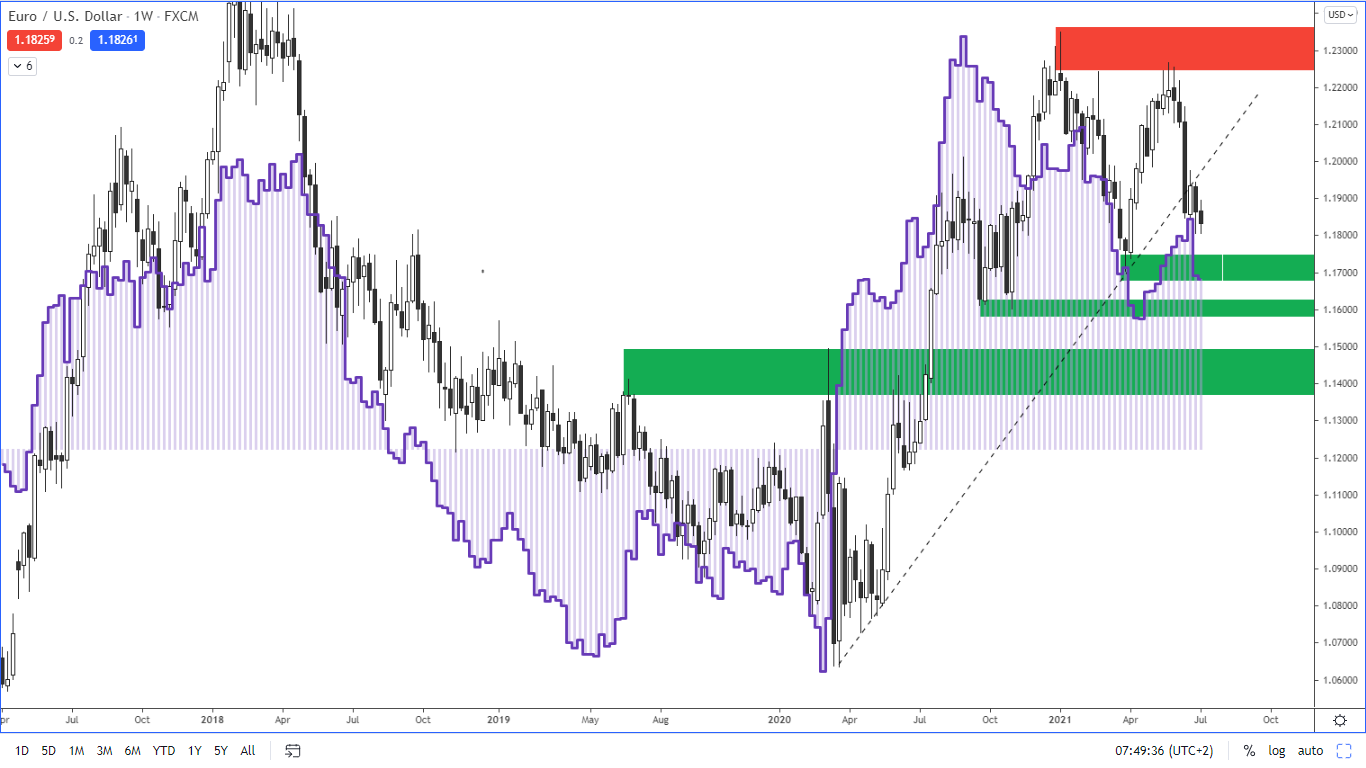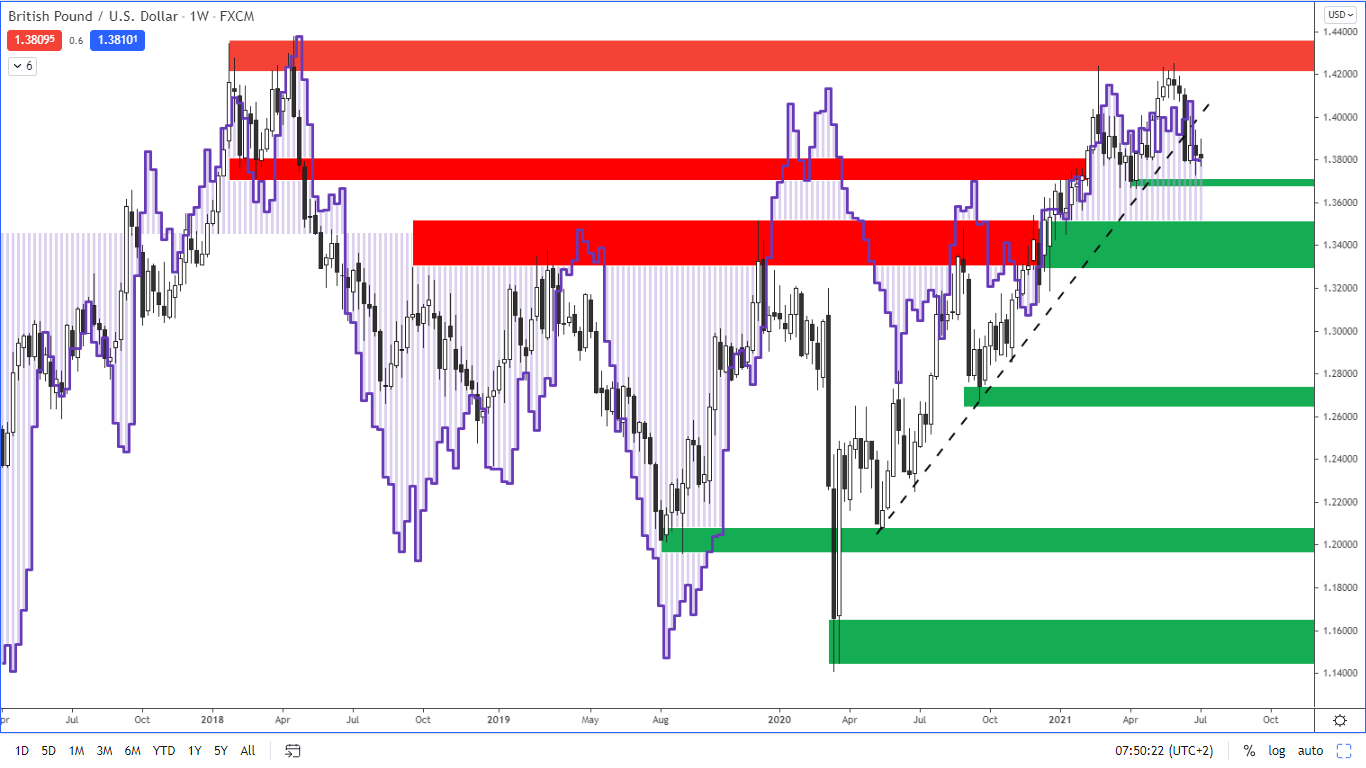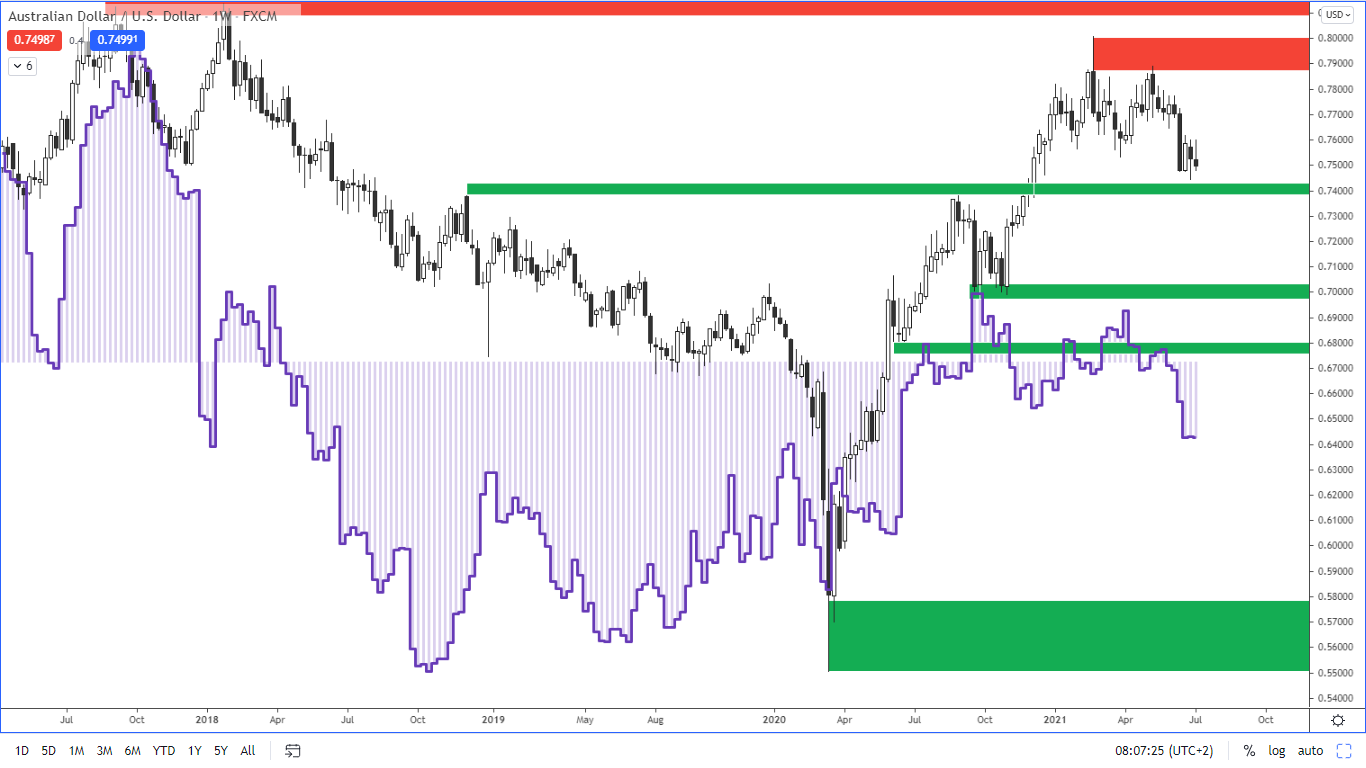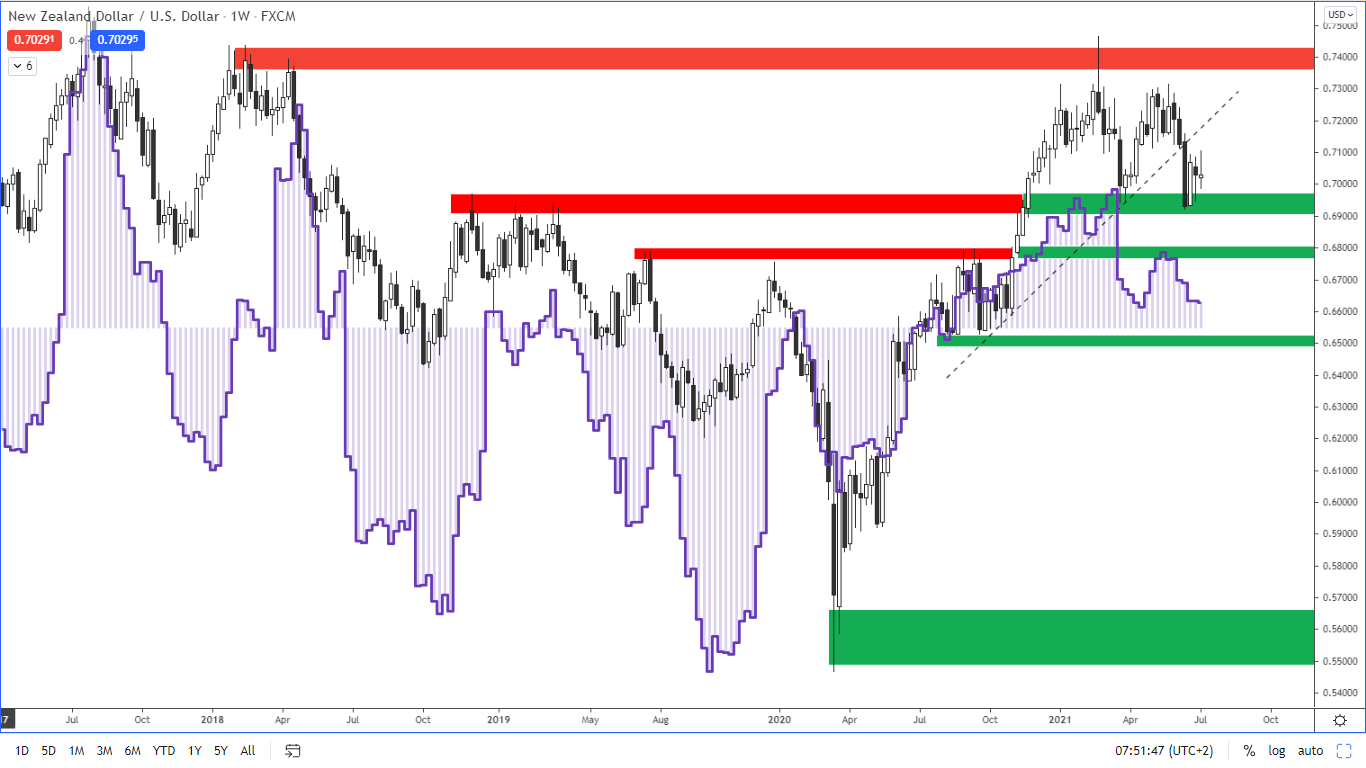Positions of large speculators according to the COT report as at 2/7/2021
Total net speculator positions in the USD index rose by 100 contracts last week. This change is the result of an increase in long positions by 600 contracts and an increase in short positions by 500 contracts.
The increase in total net speculator positions occurred in the Canadian dollar last week.
The decrease in total net positions occurred in the euro, the British pound, the Australian dollar, the New Zealand dollar, the Japanese yen, and the Swiss franc.
The positions of speculators in individual currencies
The total net positions of large speculators are shown in Table 1: If the value is positive then the large speculators are net long. If the value is negative, the large speculators are net short.
|
|
2/7/2021
|
25/6/2021
|
21/6/2021
|
11/6/2021
|
4/6/2021
|
28/5/2021
|
|
USD index
|
-400
|
-500
|
-2,300
|
1,800
|
3,000
|
2,800
|
|
EUR
|
87,200
|
89,100
|
118,200
|
107,200
|
109,300
|
104,000
|
|
GBP
|
17,700
|
17,900
|
32,200
|
27,700
|
24,100
|
30,700
|
|
AUD
|
-17,800
|
-17,600
|
-17,900
|
-9,400
|
-1,900
|
-800
|
|
NZD
|
3,100
|
3,300
|
3,300
|
5,500
|
5,900
|
8,600
|
|
CAD
|
45,800
|
43,200
|
44,300
|
45,300
|
48,800
|
46,100
|
|
CHF
|
11,100
|
13,600
|
9,400
|
1,100
|
300
|
-1,200
|
|
JPY
|
-69,900
|
-53,900
|
-46,900
|
-37,300
|
-47,100
|
-50,200
|
Table 1: Total net positions of large speculators
Notes:
Large speculators are traders who trade large volumes of futures contracts, which, if the set limits are met, must be reported to the Commodity Futures Trading Commission. Typically, this includes traders such as funds or large banks. These traders mostly focus on trading long-term trends and their goal is to make money on speculation with the instrument.
The total net positions of large speculators are the difference between the number of long contracts and the number of short contracts of large speculators. Positive value shows that large speculators are net long. Negative value shows that large speculators are net short. The data is published every Friday and is delayed because it shows the status on Tuesday of the week.
The total net positions of large speculators show the sentiment this group has in the market. A positive value of the total net positions of speculators indicates bullish sentiment, a negative value of total net positions indicates bearish sentiment.
When interpreting charts and values, it is important to follow the overall trend of total net positions. The turning points are also very important, i.e. the moments when the total net positions go from a positive value to a negative one and vice versa. Important are also extreme values of total net positions as they often serve as signals of a trend reversal.
Sentiment according to the reported positions of large players in futures markets is not immediately reflected in the movement of currency pairs. Therefore, information on sentiment is more likely to be used by traders who take longer trades and are willing to hold their positions for several weeks or even months.
Detailed analysis of selected currencies
Explanations:
Purple line and histogram in the chart window: this is information on the total net position of large speculators. This information shows the strength and sentiment of an ongoing trend.
Green line in the indicator window: these are the bullish positions of large speculators.
Red line in the indicator window: indicates the bearish positions of large speculators.
If there is a green line above the red line in the indicator window, then it means that the overall net positions are positive, i.e. that bullish sentiment prevails. If, on the other hand, the green line is below the red line, then bearish sentiment prevails and the overall net positions of the big speculators are negative.
Information on the positions of so-called hedgers is not shown in the chart, due to the fact that their main goal is not speculation, but hedging. Therefore, this group usually takes the opposite positions than the large speculators. For this reason, the positions of hedgers are inversely correlated with the movement of the price of the underlying asset. However, this inverse correlation shows the ongoing trend less clearly than the position of large speculators.
Charts are made with the use of www.tradingview.com.
Euro
|
Date
|
Weekly change in open interest
|
Weekly change in total net positions of speculators
|
Weekly change in total long positions of speculators
|
Weekly change in total short positions of speculators
|
Sentiment
|
| 2/7/2021 |
2,600 |
1,900 |
1,200 |
3,100 |
Weakening bullish |
| 25/6/2021 |
100 |
-29,100 |
-3,000 |
26,100 |
Weakening bullish |
| 21/6/2021 |
-48,400 |
11,000 |
-21,300 |
-32,300 |
Bullish |
 Figure 1: The euro and COT positions of large speculators on a weekly chart
Figure 1: The euro and COT positions of large speculators on a weekly chart
Total net speculator positions fell by 1,900 contracts last week. This change is due to an increase in long positions of 1,200 contracts and an increase in short positions of 3,100 contracts.
The price of the euro weakened last week.
Long-term resistance: 1.2240 - 1.2350
Long-term support: 1.1700 - 1.1750
The British pound
|
Date
|
Weekly change in open interest
|
Weekly change in total net positions of speculators
|
Weekly change in total long positions of speculators
|
Weekly change in total short positions of speculators
|
Sentiment
|
| 2/7/2021 |
-2,100 |
-200 |
200 |
400 |
Weakening bullish |
| 25/6/2021 |
15,200 |
-14,300 |
-3,800 |
10,500 |
Weakening bullish |
| 21/6/2021 |
-15,500 |
4,500 |
-4,000 |
-8,500 |
Bullish |
 Figure 2: The GBP and COT positions of large speculators on a weekly chart
Figure 2: The GBP and COT positions of large speculators on a weekly chart
Last week, the total net positions of speculators fell by 200 contracts. This change is the result of an increase in long positions by 200 and an increase in short positions by 400 contracts.
The pound weakened slightly against the US dollar last week.
Long-term resistance: 1.42-1.4350
Long-term support: 1.3670-1.3700
The Australian dollar
|
Date
|
Weekly change in open interest
|
Weekly change in total net positions of speculators
|
Weekly change in total long positions of speculators
|
Weekly change in total short positions of speculators
|
Sentiment
|
| 2/7/2021 |
-7,300 |
-200 |
-7,300 |
-7,100 |
Bearish |
| 25/6/2021 |
23,600 |
300 |
16,000 |
15,700 |
Bearish |
| 21/6/2021 |
-24,500 |
-8,400 |
-8,000 |
400 |
Bearish |
 Figure 3: The AUD and COT positions of large speculators on a weekly chart
Figure 3: The AUD and COT positions of large speculators on a weekly chart
Last week, speculators' total net positions fell by 200 contracts. This change is due to a decrease in long positions by 7,300 contracts and a decrease in short positions by 7,100 contracts.
The Australian dollar has been weakening over the past week and is hovering near the 0.7450 support.
Long-term resistance: 0.7870-0.8000
Long-term support: 0.7530-0.7600
The New Zealand dollar
|
Date
|
Weekly change in open interest
|
Weekly change in total net positions of speculators
|
Weekly change in total long positions of speculators
|
Weekly change in total short positions of speculators
|
Sentiment
|
| 2/7/2021 |
2,000 |
-200 |
700 |
900 |
Weakening bullish |
| 25/6/2021 |
1,400 |
0 |
700 |
700 |
Weakening bullish |
| 21/6/2021 |
-7,900 |
-2,200 |
-3,500 |
-1,200 |
Weakening bullish |
 Figure 4: The NZD and the position of large speculators on a weekly chart
Figure 4: The NZD and the position of large speculators on a weekly chart
Last week, total net positions fell by 200 contracts, which is the result of a 700-contract increase in long positions and a 900-contract increase in short positions.
The NZD weakened slightly last week and retested the support level.
Resistance: 0.7370-0.7450
The nearest support: 0.6900-0.6960